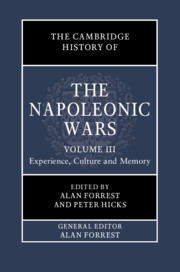Book contents
- The Cambridge History of the Napoleonic Wars
- The Cambridge History of the Napoleonic Wars
- The Cambridge History of the Napoleonic Wars
- Copyright page
- Contents
- Figures
- Maps
- Contributors to Volume III
- Introduction to Volume III
- Part I The Experience of War
- Part II The Experience of Imperial Rule
- Part III War, Culture and Memory
- 12 Memoirs and the Communication of Memory
- 13 Festivals, Ceremonies and Public Commemorations
- 14 The Portrayal of Heroism
- 15 The Fine Arts and the Napoleonic Wars
- 16 Poets and Novelists: Writing the Memory of War
- 17 Political Keyboard Music in Revolutionary and Napoleonic France: ‘The Battle’
- 18 The Napoleonic Wars in Caricature
- 19 The Napoleonic Wars in European Cinema
- 20 Nostalgia, or a Ruin with a View
- Part IV The Aftermath and Legacy of the Wars
- Bibliographic Essays
- Index
16 - Poets and Novelists: Writing the Memory of War
from Part III - War, Culture and Memory
Published online by Cambridge University Press: 05 August 2022
- The Cambridge History of the Napoleonic Wars
- The Cambridge History of the Napoleonic Wars
- The Cambridge History of the Napoleonic Wars
- Copyright page
- Contents
- Figures
- Maps
- Contributors to Volume III
- Introduction to Volume III
- Part I The Experience of War
- Part II The Experience of Imperial Rule
- Part III War, Culture and Memory
- 12 Memoirs and the Communication of Memory
- 13 Festivals, Ceremonies and Public Commemorations
- 14 The Portrayal of Heroism
- 15 The Fine Arts and the Napoleonic Wars
- 16 Poets and Novelists: Writing the Memory of War
- 17 Political Keyboard Music in Revolutionary and Napoleonic France: ‘The Battle’
- 18 The Napoleonic Wars in Caricature
- 19 The Napoleonic Wars in European Cinema
- 20 Nostalgia, or a Ruin with a View
- Part IV The Aftermath and Legacy of the Wars
- Bibliographic Essays
- Index
Summary
On Waterloo Day, 18 June 1875, the poet and novelist Thomas Hardy visited Chelsea Hospital to speak with the survivors of a battle that predated his birth by a quarter of a century. As the author’s second wife Florence Emily Hardy records, the veterans’ recollections of the conflict were captured in striking, imagistic fragments, reminiscent of the ‘sensory, perceptual and emotional components’ associated with traumatic memory:1 the sight of ‘bayonets, helmets and swords’ glinting through ‘the haze of smoke’; a sense impression of lying uncovered on ‘the wet eve of battle’, as if the man were ‘speaking on the actual day’.2 While for Hardy, Waterloo represented the climax of a ‘Great Historical Calamity’,3 far removed from the relative peace and security of his own times, for these war-torn veterans the battle was an all-too-present event that refused to lend itself fully to narrative coherence.
- Type
- Chapter
- Information
- The Cambridge History of the Napoleonic Wars , pp. 328 - 346Publisher: Cambridge University PressPrint publication year: 2022

